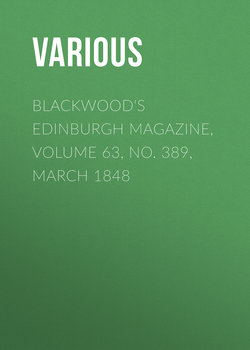Blackwood's Edinburgh Magazine, Volume 63, No. 389, March 1848

Реклама. ООО «ЛитРес», ИНН: 7719571260.
Оглавление
Various. Blackwood's Edinburgh Magazine, Volume 63, No. 389, March 1848
MR COBDEN ON THE NATIONAL DEFENCES
ROMANISM IN ROME. CATECHISM IN THE MINERVA
CRIMES AND REMARKABLE TRIALS IN SCOTLAND
SIR SIDNEY SMITH
MY ROUTE INTO CANADA
THE INTERCEPTED LETTERS
GREENWICH TIME
A MILITARY DISCUSSION TOUCHING OUR COAST DEFENCES
HUDSON'S BAY
THE BUDGET
Отрывок из книги
Visitors to Rome are ofttimes puzzled and surprised at hearing the very unusual affix, della Minerva, applied to one of the Christian churches of that city; more especially when they find it also familiarly known to the common people, not so well read as their priests in the calendar of the saints, as La Sta. Minerva; but the apparent misnomer originates in an ellipsis of the full title, which runs thus, Sta. Maria sopra Minerva– the church in question having supplanted a temple formerly dedicated to Pallas, upon the ruins of which it has been reared. But though the goddess of wisdom still retains a nominal interest in the edifice, certainly, to judge from the catechetical exercises of which we are about to give a specimen, her reign is past, and there remains but the nominis umbra in lieu of it. Exorcised the church, she has been fain to accept such a humiliating asylum in the library adjoining, as inquisitorial Dominicans would be likely to afford a heathen goddess, whose proceedings they must narrowly watch. There she has the mortification of hearing, from year to year, some new relay of "gray-hair'd synods damning books unread," and, club-fashion, blackballing all her friends in order to make way for their own; just as old Pope Gregory is said to have burned a whole library of Pagan literature, that the Christian Fathers and Roman Catholic Saints might have more elbow-room; and also that, in the absence of rivals, their authority might not be disputed. "Fertur beatus Gregorius bibliothecam combussisse gentilum, quo divinæ paginæ gratior esset locus et major auctoritas et diligentia studiosior."1
At Easter-tide, those who have any curiosity on the subject may hear Bellarmine's Catechism, as it is squealed, bawled, or otherwise intonated by the young children of the different Riones, and commented on and explained for their edification by the pedagogue priest of the district. He is generally surrounded at such times by a bevy of from forty to fifty scholars, gamins or gamines as the case may be; and to work they set with such earnestness of vociferation that all Bedlam and Parnassus, raving and reciting together, could not well surpass the discord: the shrill diapason, peeling through nave and aisle, shakes the floating Baldaquino, and makes the trembling walls bellow again, furnishing an apt and lively illustration of the "convulsaque marmora clamant" of the poet.
.....
No doubt of it! enough and to spare! This is a fine specimen of the class of truths called unquestionable. There is, moreover, a pleasing enjouement about this last line, which recommends it to our regard. The teacher seems to be expostulating with her young charge, and saying, "My dear little four-year-old, eager for instruction beyond your years, but fearful of learning up every thing at school, – don't be frightened; the world will always find science sufficient to employ all good little boys like you." But though this truth be unquestionable, we doubt whether the line which conveys it be genuine; and rather fancy, should the original manuscript turn up, it would be found to run —
which, though somewhat harsh to the ear, conveys an excellent meaning. Should this be thought to make the verse too rugged, we have yet a second various reading to propose, and that is simply to change the last word into bore, by which means the easy flow of the verse is preserved, and the significatio prœgnans of the original, though somewhat modified, is maintained.
.....